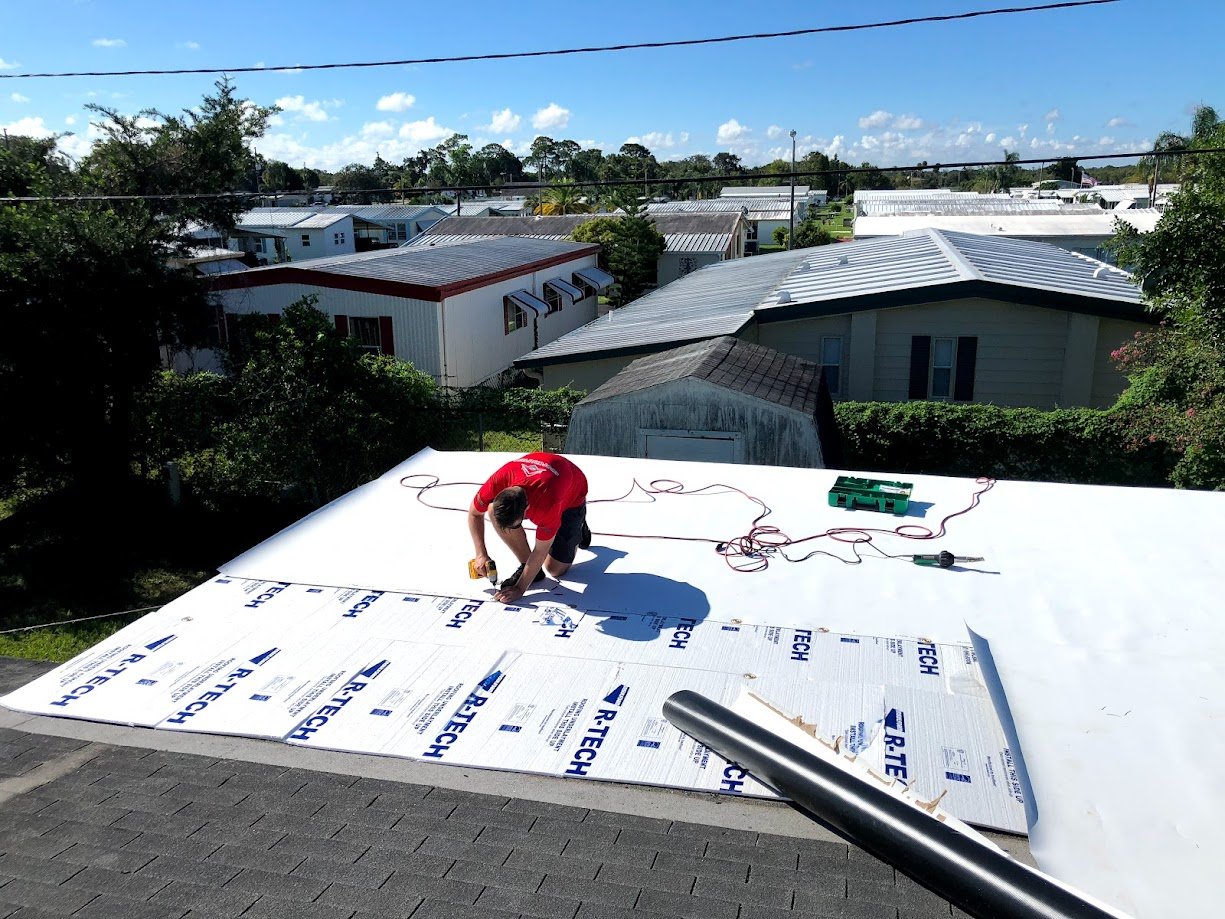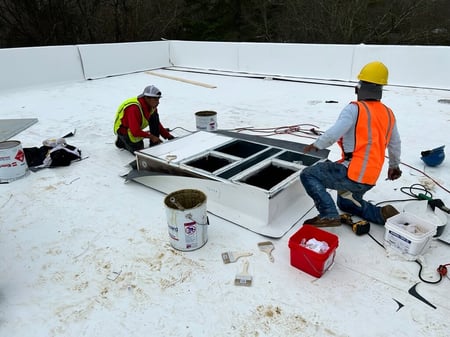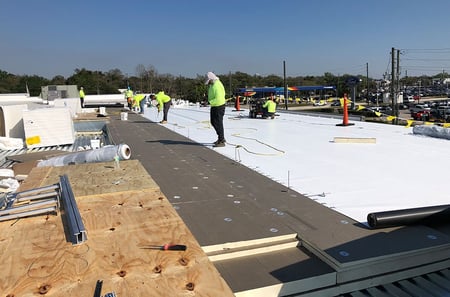
If you're exploring roofing options and are curious about PVC roofing, you’ve come to the right place. PVC (Polyvinyl Chloride) is a solid choice for many reasons. It's durable, energy-efficient, and requires minimal upkeep. But before you make any decisions, it's essential to dive deep into the pros and cons, of course!
At RoofCrafters, we’ve been installing and maintaining PVC roofing systems for nearly 30 years. This "old reliable" option has a lot to offer, whether you’re considering it for a home or commercial building. However, like anything, PVC roofing may be perfect for some and not ideal for others. The good news? We're here to guide you through your research.
In this article, we’ll break down everything you need to know about PVC roofing, from its benefits and drawbacks to the types of buildings where it works best. By the end, you'll have a clear understanding of whether PVC roofing is the right fit for your needs. Ready to jump in? Let’s get started!
What Is PVC Roofing?

PVC, or Polyvinyl Chloride, is a synthetic plastic polymer used in many applications, including roofing. PVC roofing membranes are crafted by blending PVC with other additives and reinforcing materials, creating a strong, flexible, and highly resistant material. This makes PVC roofing an excellent choice for both residential and commercial buildings.
Benefits of PVC Roofing
PVC roofing offers numerous benefits, making it a popular choice among homeowners and business owners alike. Let’s take a closer look at what makes PVC a standout option.
Durability and Longevity
One of the most significant advantages of PVC roofing is its durability. With proper maintenance, a PVC roof can last anywhere from 20 to 30 years. It’s built to withstand a variety of weather conditions, including high winds, heavy rain, and even hail.
Energy Efficiency
PVC roofing is known for its energy efficiency. The material’s reflective properties significantly reduce the amount of heat absorbed by your home or building, helping to keep indoor temperatures cooler. This can lead to lower energy bills and reduced strain on your HVAC system.
Low Maintenance
When it comes to upkeep, PVC roofing is about as low-maintenance as it gets. Routine inspections and occasional cleanings are usually all that’s needed to keep your roof in top condition.
Waterproof and Leak-Resistant
PVC roofing is inherently waterproof, offering excellent protection against leaks. The seams of PVC roofs are heat-welded, creating a seamless and watertight barrier that keeps moisture out.
Chemical Resistance
For industrial or commercial settings where exposure to chemicals is common, PVC roofing is an ideal choice. The material is highly resistant to chemicals, making it a durable option for these environments.
Challenges and Considerations with PVC Roofing

No roofing material is perfect, and PVC is no exception. Being aware of its challenges can help you make an informed decision.
Initial Cost
PVC roofing tends to have a higher upfront cost compared to more traditional materials. However, the long-term benefits—such as durability, energy efficiency, and low maintenance—often justify this initial investment.
Temperature Sensitivity
PVC can be sensitive to extreme temperature fluctuations, which may cause it to expand or contract. While the material has good thermal stability, proper installation is crucial to prevent issues related to temperature changes.
Environmental Concerns
As a synthetic plastic, PVC does raise some environmental concerns. The production process involves the use of fossil fuels and generates certain byproducts. However, PVC is recyclable and can be repurposed, which helps mitigate its environmental impact.
Common Issues Associated with PVC Roofing

There are a few issues commonly associated with PVC roofing that you should be aware of. Understanding these can help you decide whether this material is the right choice for your property.
Water Pooling
One significant concern with PVC roofing is water pooling or "ponding." This occurs when water accumulates on the roof's surface, usually due to inadequate drainage or poor installation. Over time, standing water can cause structural damage and lead to leaks. Ensuring proper drainage and regular inspections are essential to prevent this issue.
Seam Problems
Seams are the areas where two PVC sheets are joined together. If not correctly welded during installation, or if they weaken over time, these seams can become a source of leaks. Regular maintenance and timely repairs are crucial to maintaining the integrity of your PVC roof.
Punctures and Tears
While PVC roofing is durable, it’s not immune to punctures or tears, especially from falling debris, hail, or sharp objects. These small punctures can lead to leaks if not addressed promptly. Regular inspections and repairs can prevent these issues from escalating.
Roof Shrinkage
PVC roofing can experience shrinkage, particularly during extreme temperature changes. This shrinkage can cause the material to pull away from the roof's edges, flashings, or other protrusions. Proper installation and accommodating potential shrinkage in the roofing system can help mitigate this problem.
Fading and Chalking
Over time, exposure to the sun’s ultraviolet (UV) rays can cause PVC roofing to fade and chalk. While this doesn’t impact the roof’s performance, it can affect its appearance. Opting for PVC roofing with UV-resistant coatings can help maintain its aesthetic appeal.
Poor Workmanship
Like any roofing system, the quality of installation plays a crucial role in the performance of PVC roofing. Faulty installation or poor workmanship can lead to a range of issues, including leaks, seam failures, and premature aging. It’s vital to hire experienced and reputable roofing contractors to ensure your PVC roof is installed correctly.
Addressing Water Pooling on PVC Roofs

Water pooling is a critical issue that demands immediate attention. To keep your PVC roof in optimal condition, ensure it has proper drainage and undergoes regular maintenance. Addressing water pooling promptly can prevent long-term damage and extend the life of your roof.
Is PVC Roofing Suitable for Different Building Types?
The versatility of PVC roofing makes it a suitable option for various building types. Let’s explore where PVC roofing works best.
Commercial Buildings
PVC roofing is a top choice for commercial buildings like shopping centers, restaurants, and office complexes. Its durability allows it to withstand heavy foot traffic, and its low-maintenance nature aligns well with the demands of busy commercial spaces. Plus, its energy efficiency contributes to maintaining a comfortable indoor environment, reducing operational costs.
Industrial Facilities
In industrial settings, where roofs are often exposed to chemicals, heat, and other harsh elements, PVC roofing is a strong contender. Its chemical resistance makes it an excellent fit for industrial buildings, and it can endure extreme temperatures without compromising its structural integrity.
Institutional Buildings (Schools, Hospitals, etc.)
Schools, hospitals, and other institutional buildings benefit from PVC roofing's longevity and low maintenance. Its reflective surface helps maintain a comfortable indoor temperature, which is crucial for educational and healthcare facilities.
Residential Homes
While PVC roofing is traditionally used in commercial settings, it’s becoming increasingly popular for certain residential homes, particularly those with flat or low-slope roofs. Homeowners appreciate PVC’s long lifespan, energy efficiency, and resistance to weather conditions.
Making the Final Decision: Is PVC Roofing Right for You?
PVC roofing is a solid option for anyone seeking a durable, energy-efficient, and low-maintenance roofing material. Its longevity, energy-saving features, and versatility across various building types make it a reliable choice in the roofing industry.
However, the initial cost and potential temperature sensitivity are factors to consider based on your specific needs and circumstances. Remember, your roof is a long-term investment. Taking the time to choose the right material will ensure you have a sturdy, reliable roof over your head for years to come.
If you’re in one of our service areas in Florida, Georgia, or South Carolina, RoofCrafters is here to help! When you’re ready, click the "schedule an inspection" button to connect with one of our friendly representatives. We’re excited about the opportunity to work on your roofing project!
My name is Kevin Mills, and I am the lead estimator for RoofCrafters’ Tampa division. I’m originally from Michigan, and I enjoy hunting, fishing, and spending any free time outdoors. What I’m most passionate about, though, is helping business owners and homeowners alike achieve their roofing goals, all while providing a seamless customer journey.



